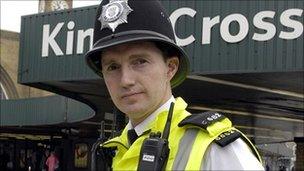12 of 32 police in Wales kept jobs after breaking law, figures show
- Published

Crimes committed ranged from supplying drugs to possessing indecent images of children
More than a third of the 32 serving police and support officers in Wales who broke the law in the past five years kept their jobs, figures show.
Officers who committed serious crimes, including supplying drugs, possessing indecent images of children and drink-driving were dismissed or resigned.
But a dozen of those who carried out other offences, including violence and animal cruelty, stayed in their posts.
The forces say officers are held to account to high professional standards.
Figures obtained by BBC Wales through a Freedom of Information request to the four forces in Wales show at least 32 serving police and community support officers have committed crimes since January 2007.
Six officers were jailed, two given suspended jail sentences and 14 fined, among other sanctions.
The 12 who retained their jobs had mostly committed traffic offences such as driving without due care and attention, and speeding, but the figures also included several other offences.
North Wales Police: two officers were convicted of animal cruelty; a Police Community Support Officer (PCSO) was arrested and cautioned for violence; and a constable cautioned for a data protection offence.
In the animal cruelty case, the force fined the officers - who had caused suffering and "mental terror" to their two pet dogs - 10 days' pay on top of court sanctions which included a ban from keeping any animal for five years; the PCSO cautioned for violence was given a first written warning; and the constable cautioned for a data protection offence was given a final written warning.
Dyfed-Powys Police: One officer given a conditional discharge for several personal data offences also stayed in post. This officer received a written warning and has since retired.
Gwent Police: One officer remained in post after driving without due care and attention. The conviction led to a 12-month driving ban and £2,000 fine, and no further action was taken by the force.
South Wales Police: Did not issue the relevant information.
There are around 7,422 police officers serving in Wales.
Monmouth MP David Davies, a special constable, said any police officer who committed a criminal offence would be investigated by the relevant force and it would be taken very seriously.
"If police officers are to be treated as the same as everyone else, you can't sack them just because they've been caught speeding," he said.
"Every case needs to be judged on its merits.
"There are 12 cases there [of officers committing offences but keeping their jobs]. That's 12 out of thousands of people and I'm sure each was looked at very, very carefully.
"The onus would be on the officer to show why they shouldn't be dismissed from their job."
He added that police officers were far more likely to be the victim of a violent crime than the perpetrator of one.
Child abuse
The vast majority of crimes committed by officers in the past five years involved PCs, PCSOs and special constables, but there were also examples of cases involving higher ranking officers, including an inspector.
Some of the more serious crimes included:
A former South Wales Police inspector was jailed for 30 months in December for conspiracy to encourage others to sexually assault a child under 13.
A South Wales Police traffic officer was sentenced to three-and-a-half years in 2010 for having sex with female drivers in exchange for excusing their motoring offences.
A Gwent Police detective constable was jailed for a year in April 2010 after being convicted of distributing, making and possessing indecent images. He was part of a British paedophile ring which swapped images of child abuse.
A Dyfed-Powys Police constable was given a three-year supervision order and required to register as a sex offender for five years for possessing indecent images of children in 2007.
A North Wales Police officer who lied about a motoring offence when stopped by colleagues, was jailed for four months for perverting the course of justice.
Other offences committed by officers in the past five years include taxi touting, sexual exposure, theft and violence against the person.

David Davies, an MP and special constable, says police are more likely to be victims than perpetrators
South Wales Police provided only part of the information requested but information provided by the other three forces in Wales showed that in cases of serious crimes, officers were either dismissed or resigned.
Lee Canning, of the TaxPayers' Alliance in Wales, said offences committed by officers needed to be looked at "case by case".
"Driving offences are so easy to obtain. I'm not a driver myself but if you are one mile [per hour] over the speed limit, that can happen," he said.
"When you come down to animal cruelty and personal data offences, these are serious instances.
Misconduct proceedings
"We do have to look at what sort of regulations are in place to protect the public against that."
Home Office guidance states that public confidence in the police is "crucial in a system that rests on the principle of policing by consent".
"Public confidence in the police depends on police officers demonstrating the highest level of personal and professional standards of behaviour," it says.
Each police force has a professional standards department which is responsible for considering complaints and conduct matters involving police officers and police staff within its force.
Misconduct proceedings are considered when it is believed an officer has breached standards of professional behaviour. Cases are judged on their individual merits but, where the action is so serious as to warrant the officer losing their job, then gross misconduct proceedings are instigated.
Commit crimes
That process can result in dismissal, but mitigation is presented and there are other sanctions the panel can consider.
Michael Levi, professor of criminology at Cardiff University, said the figures indicated that police officers were less likely to commit crimes than the general population.
"The general statistics are that one in three males can expect to be convicted of something over their lifetimes," he said.
He added: "If the offence is not that salient to how they do their job, they're kept on and, personally, I would agree with that.
"We should see people as more complex and this applies to other offenders as well.
"Just because you do a bad thing does not mean you are going to generally a bad person."
Separate research published earlier this year suggested there were 27 serving police officers and community support officers with Welsh forces who had a criminal record, 23 of whom were with North Wales Police. South Wales Police did not provide figures.
- Published24 January 2011
- Published2 January 2012
- Published13 December 2011
- Published25 November 2011
- Published20 October 2011
- Published26 September 2011
- Published10 August 2011
- Published7 March 2011